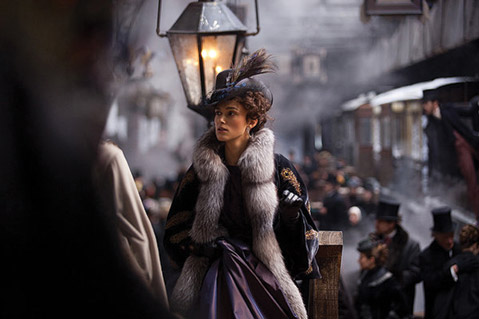Anna Karenina
Keira Knightley, Jude Law, and Aaron Taylor-Johnson star in a film written by Tom Stoppard, based on the novel by Leo Tolstoy, and directed by Joe Wright.

Taking on Leo Tolstoy and daring to bring his masterpiece 1877 novel Anna Karenina to the screen is not a task for the faint of heart or concept. While there is plenty to admire in director Joe Wright’s sumptuous and emotionally tempestuous version of Tom Stoppard’s script, not the least of which is the scarily beautiful Keira Knightley delivering another of her troubled-heroine performances, some small voice keeps interrupting our pleasure when the film slips into questionable or tedious territory. We’re distracted by the pesky thought: “What would Leo think?”
In Imperial Russia, circa 1874, our bedazzling heroine, the wife of an older statesman (a cool, magisterial Jude Law) has headed from her home in St. Petersburg to Moscow, where trouble of the illicit love kind awaits. The handsome Count Vronsky (Aaron Taylor-Johnson), smitten to the core, follows our heroine back home and “persuades a virtuous woman to break her marriage vows.” After they do violate decorum and disrupt Anna’s married-with-child life, they bask in the temporary bliss of believing “there’s an end to living in corners.” Alas, darker, more insidious corners are to come.
In lieu of literary properties at his disposal, Wright perhaps wisely etches the tale with seductive cinematic qualities to help propel and shade the story at the center: He uses the language of film, rather than larding up or leaning on the dialogue. In a pivotal ballroom dance scene where the ill-begotten love affair begins to flower, the dancers become frozen in suspended animation, irrelevant to the centrality of our characters.
At various points in the film, Wright jumps to the metaphorical leitmotif of a train in motion, a handy metaphor both carnal and referential to the machinery by which Anna is flung from her “sanctioned” home and her heart-fueled new life. At other times, including the opening and closing framing devices of the film, the setting of a theater stage intersects with the presumed reality of our characters doings.
This world is a stage within a film within a daunting literary source, compelling if not completely pulled together into a satisfying artistic whole. Furthermore … what would Leo think?



